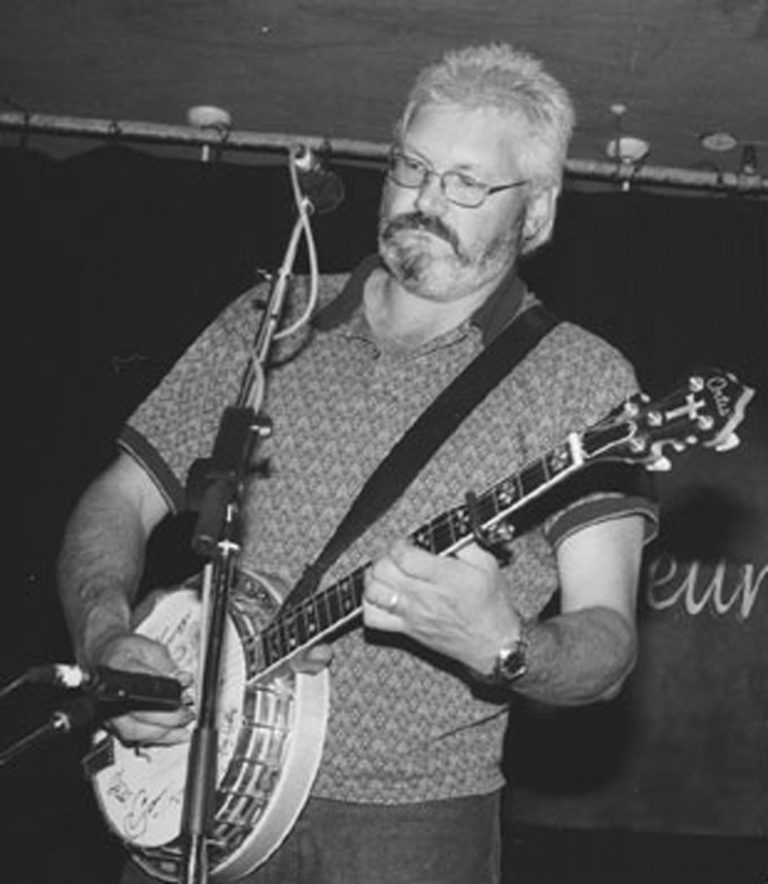Thomas Moss is carrying on and passing along a family tradition–bluegrass. In addition to being a father and full-time diesel mechanic, Moss plays at festivals and churches around the state and region with Foxfire, a group based near Bay Springs, and has released recordings both with the group and as a solo artist.
Born in Waynesboro and now living near Bay Springs, Moss’ familial and musical roots lie in Alabama. His father, T.E. Moss, was in the Countian Trio, a group that also included two of his cousins. Moss recalls as a youngster of just over ten that “Daddy started teaching how to play the guitar, and another relative, Darrel Lloyd, he started me to playing the banjo—and it went downhill from there.” Moss went on to learn the upright bass as well. With his father and cousins Moss performed classic bluegrass material by Bill Monroe, Flatt and Scruggs, and Charlie Waller, performers he recalls seeing at festivals as a child.
As Moss grew older, he abandoned bluegrass for more youth-oriented types of music. “I kindly strayed away from bluegrass when I was about eighteen. I played rock and I’ve played country. And I’ve done my time in bars—but I always come back to bluegrass.” With the birth of his son, Moss quit music altogether, feeling that barrooms were the wrong environment. After more than two years of playing nothing, his musical career was restarted by a surprise gift of a banjo from his wife.
Moss has played in various bands, including Fair River Station, and as a solo artist. But several years ago, after moving to the Bay Springs area, he joined Randy Corley (guitar, lead & harmony vocals), Jimmy Burge (bass, bass vocals), and Harry James (dobro, baritone) in Foxfire. Moss plays banjo and shares lead and harmony vocals with Corley.
Foxfire plays a combination of traditional bluegrass, including some of the same artists and songs performed by Thomas with his family, combined with gospel-themed bluegrass and some more progressive numbers in the style of artists such as Alison Krauss and Union Station, whom Moss credits for revitalizing the genre. Foxfire also performs original numbers, such as “Whippoorwill,” a number Moss wrote based on memories of his grandfather. “Back in Alabama, when I went over to stay summers I remember sitting out on his front porch, listening to the whippoorwills and the owls and the crickets sing. It’s just a song I wrote as a tribute to my grandfather.”
The band plays festivals, many of which last several days, and, more often, churches. At festivals, the band mixes traditional, gospel, and progressive numbers while limiting the repertoire to gospel at churches. Often festivals include a Thursday night of gospel performances as well. If not, Foxfire will frequently play an all-gospel set at another time in the weekend. Gospel music has traditionally and continues to be an important corollary to bluegrass. Moss adds, “We always mix gospel in with our bluegrass sets. I love southern gospel. To me, the spiritual, I guess you could call it the blues spiritual—that’s always there in bluegrass to me.”
Harmonizing vocals is a feature of classic bluegrass and requires a level of cooperation and chemistry among band members that may or may not exist. “Some people you can sing with and your voice may not hit just right. But Randy (Corley) and myself, we’ve always been able to harmonize. It’s gotten to where now it’s kind of scary sometimes, we pretty much know what the other one’s thinking.”
Despite the fact that Foxfire has released a CD and is planning another, and Moss has released a solo CD, bluegrass is not his day job. “I’m a diesel mechanic. I keep all of the (construction) equipment going. If I’m not on the job and something breaks, it just stops ‘til I get there.” Having a full-time career and family sometimes makes touring difficult for Moss, sometimes returning from an out of state festival and Sunday evening gospel show just in time to make it to work Monday morning.
Bluegrass, as a traditional form of music, seems likely to continue with musicians like Moss. His thirteen-year-old son, T.J., has learned guitar and mandolin from his father and often spends time picking with his father—making three generations of the Moss family active in bluegrass as Mr. T.E. Moss continues to occasionally play and sing at home.
-Scott McCraw

